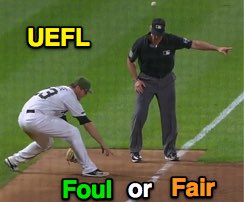 |
| 3B Umpire Paul Nauert contemplates his call. |
Challenge: Unhappy with the call's reversal, Brewers Manager Counsell briefly argued with Nauert about his reversed call before requesting, and receiving, a Replay Review, which confirmed Nauert's final call of "foul ball."
Analysis: First of all, the batted ball is clearly foul. Every once in awhile, especially on a play that explodes right in front of an umpire (in Nauert's case, maybe a yard away—at most), it's easy to get turned around, which explains Nauert's initial fair call—he wants to make an immediate call and "fair" is the first thing that comes up. Once things settled down and Nauert had time to process the play, he realized the ball was foul and called "Time" to signify as much.
We can talk timing till the cows come home (and, elsewhere on the site—not even two weeks ago—we have talked about timing and patience, even as it relates to reversing a call in real-time), but it sure looks like Nauert got turned around here more than the usual "oh, the fielder dropped the ball" mistake we usually see. I'm not sure any amount of delay here would have helped, nor been appropriate for this particular call.
Related Post: Tmac's Teachable Moments - Little Roller Up Along First (6/28/18).
Related Post: Much Patience and Good Judgment - Reversing a Call (2/26/17).
 |
| Counsell is frustrated after losing 2 RBI. |
If the third base umpire doesn't think he made a mistake, he'll follow the batted ball bounce along the wall. If the third base umpire thinks he failed to call a fair ball foul, he'll freeze his stare at its divot before realizing he can fix the erroneous call simply by calling "Time" and explaining that the ball was indeed foul.
Err on the Side of Fair: Generally speaking, a call of "fair" can be corrected to "foul" if necessary because no additional dominoes fall by reversing "fair" to "foul" other than bringing the batter and runners back and adding a strike to the count (or keeping it as a two-strike count). There are no other consequences (other than, perhaps, to the crew's pride), so this play is relatively easy to correct if the initial call is clearly erroneous, such as Nauert's was. If it happens more than roughly once per game, though, the crew's credibility will suffer.
Unring the Bell: On the other hand, a call of "foul" cannot as easily be corrected to "fair" because of the added implications of placing runners and trying to figure out what would have happened had the correct call of "fair" been made in the first place. Invariably, the offensive manager will want a baserunner from first to score and the defensive manager will want a blanket two-base award, if that (assuming the defensive manager hasn't already been ejected for losing his mind at the reversed call).
As is said, you can't unring the bell, and, in this case, the call of "foul ball" is the bell.
Replay Review is Complicated: Not all line drives to the corner umpires are eligible for replay.
Had Replay Review overturned Nauert's foul ball call (to that of a fair ball), defensive team (Pirates) Manager Clint Hurdle may have tried arguing that Nauert and Crew Chief Kerwin Danley permitted a review on a call ineligible for review.
 |
| Replay: The one persisting error. |
As it stands, replays indicate Nauert retreated as he sensed the ball squealing toward him, which would suggest that the batted ball indeed landed even with Nauert's "set position" (e.g., where he started the play), which would make the call eligible for review. Nonetheless, this close call pertaining to replay eligibility is yet another aspect of the play the umpire must consider, which brings us to somewhat of a Replay Review paradox.
 |
| Does this ball land even with or in front of U3? |
The paradox, thus, is an amusing footnote that the umpire's judgment as to whether a ball has landed in front of his set position or not is, itself, not subject to replay review and cannot be challenged, all while his judgment as to whether the ball landed to the left or right of a foul line is subject to review.
In my tongue-in-cheek estimation, the foul ball call is confirmed (as it was per NY's ruling), while the determination that the ball landed even with U3 stands (again, not that this aspect of umpire judgment was even eligible for review in the first place).
As is said, in the Replay Review era, there are no neighborhood plays. If the Replay Review Regulation says that balls that land "in front" are not eligible for review, then they aren't. Not by 10 feet, and not by half-of-an-inch. Or at least until MLB rewrites the regulation.
Video as follows:










0 comments :
Post a Comment